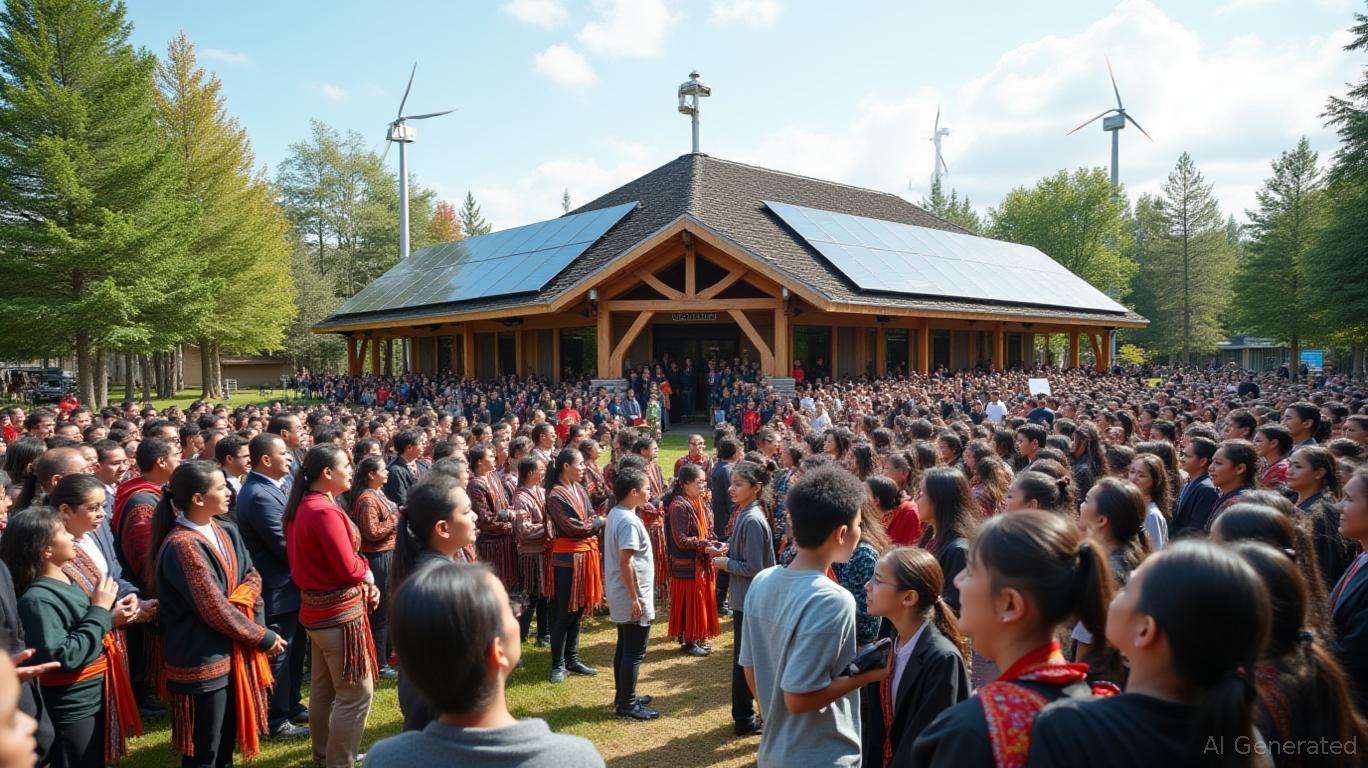Canada’s inaugural Indigenous AI campus leads the way in advancing clean energy independence
- Vancouver-based DMG and Malahat Nation signed an MOU to create MDULP, a regulated utility majority-owned by the Indigenous community for clean tech and AI infrastructure in British Columbia. - The partnership aims to develop 30 MW of sovereign AI data centers, renewable energy projects, and interconnect with BC Hydro, aligning with Malahat's environmental and economic goals. - The initiative emphasizes Indigenous sovereignty, job creation, and clean energy adoption, positioning Canada's first Indigenous-
DMG Blockchain Solutions Inc., headquartered in Vancouver and listed on the TSX-V as DMGI, has entered into a second Memorandum of Understanding (MOU) with the Malahat Nation's Economic Development Corporation (YOS). This agreement establishes the Malahat-DMG Utility Limited Partnership (MDULP), a regulated utility primarily owned by the Indigenous community. The collaboration is set to support new clean technology and digital infrastructure initiatives on Malahat Nation territory near Mill Bay, British Columbia, and represents a significant step in launching Canada’s inaugural Indigenous-led AI data center campus, according to a

This MOU expands upon a 2024 partnership to jointly develop 30 megawatts of sovereign AI data centers, with equal ownership between Malahat and DMG. The newly formed utility will deliver electricity and natural gas to power AI computing, green energy, and industrial projects, with intentions to connect to BC Hydro and collaborate with FortisBC for future gas distribution, the announcement stated. Malahat Nation Chief Gordon Harry highlighted the broader impact of the initiative, saying, "This collaboration is about more than just infrastructure—it's about asserting sovereignty." The utility is anticipated to support both the AI data center and community infrastructure, reflecting Malahat’s commitment to environmental stewardship and economic progress, the announcement continued.
Sheldon Bennett, CEO of DMG, underscored the partnership’s role in advancing clean energy and reconciliation: "We are privileged to partner with Malahat Nation to create and implement a Canadian Indigenous-led regulated utility. This collaboration illustrates how clean energy, digital infrastructure, and reconciliation can progress together." The project will involve upgrading substations and building out energy infrastructure, generating sustainable employment and training opportunities for Malahat members, according to the announcement.
This initiative is part of a broader movement where blockchain and AI firms are increasingly turning to renewable energy to power high-performance computing (HPC) and data centers. DMG’s integrated approach, which merges blockchain operations with eco-friendly energy solutions, positions the company to meet the rising demand for energy-efficient AI infrastructure. The alliance between Malahat and DMG also supports Canada’s national efforts to expand clean energy use, especially in areas rich in renewable resources, the announcement noted.
Although the agreement still requires final contracts, the project has already prompted regulatory reviews and community discussions. YOS, Malahat Nation’s economic development arm, focuses on projects that respect Indigenous principles and traditions, ensuring that development benefits future generations. The creation of this utility could serve as a model for other Indigenous-led energy initiatives across Canada, promoting economic strength while decreasing dependence on fossil fuels, the announcement observed.
The success of this partnership will depend on addressing logistical and regulatory obstacles, such as securing interconnection agreements and finalizing project schedules. Nevertheless, both organizations are optimistic about overcoming these challenges, citing Malahat’s expertise in Indigenous economic growth and DMG’s background in blockchain and energy infrastructure, the announcement reported.
As the global appetite for AI-powered computing grows, the Malahat-DMG utility highlights the convergence of clean energy and advanced technology. By combining sovereign energy solutions with AI infrastructure, the project not only advances Malahat Nation’s self-governance but also supports Canada’s transition to a cleaner energy future.
Disclaimer: The content of this article solely reflects the author's opinion and does not represent the platform in any capacity. This article is not intended to serve as a reference for making investment decisions.
You may also like
Bitcoin News Update: Zcash Soars by 496% as Privacy Technologies Gain Traction Amid Regulatory Challenges
- Zcash (ZEC) surged 496% in 3 months due to privacy shielding tech adoption and rising on-chain activity, trading near $235.59. - Over 30% of ZEC supply is shielded via zero-knowledge proofs, boosting transparent layer demand while futures open interest hit $307.78M. - Price targets $300+ if it breaks above 20-period EMA, but regulatory hurdles and macro risks like U.S.-China tensions pose adoption challenges. - Privacy-focused crypto outperformed Bitcoin/Ethereum amid volatility, with institutional/retai

Solana News Update: Widespread Crypto Adoption Accelerates as Institutional Staking Surges by $2 Billion
- Coinbase Prime and Figment expanded institutional staking to Solana, Cardano, and 5+ PoS networks, enabling $2B+ in onchain yield generation via integrated custody solutions. - The partnership combines Figment's $18B+ staking infrastructure with Coinbase's security controls, offering institutions diversified validator access without fund transfers. - Bitwise's BSOL Solana ETF debuted with $222.8M AUM and 7%+ yield, reflecting growing institutional demand for ESG-aligned crypto assets and accelerated ETF

Policymakers Ignore Potential Crypto Tax Income for Infrastructure
- Q3 2025 crypto M&A hit $10B as institutional demand and pro-crypto regulations drive integration with traditional finance. - Despite robust VC funding (e.g., Coinbase's $375M Echo acquisition), no evidence links crypto taxes to public infrastructure spending. - Geopolitical stability (e.g., U.S.-China talks) boosts crypto markets, yet policymakers ignore channeling crypto tax revenue into infrastructure unlike energy sectors. - $550B Japan-U.S. energy deals and Hitachi's AI partnerships highlight infrast

Partisan Dispute Over Health Insurance Subsidies Triggers Second Largest Government Shutdown on Record
- U.S. government shutdown hits 23rd day, second-longest in history, due to partisan disputes over Affordable Care Act subsidies. - 1.6 million federal workers furloughed or unpaid; Trump's RIF plan faces legal challenges for violating Antideficiency Act. - Economic losses exceed $41B as delayed data disrupts Fed policy; military payrolls face risks amid failed accounting measures. - Unions sue over politicized workforce cuts; $130M anonymous donation temporarily covers military pay but raises sustainabili
